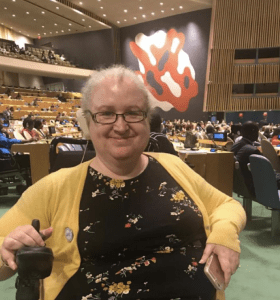Delivering Better, More Inclusive Change. Member Spotlight: Mary Keogh
Mary Keogh is an experienced advocacy director from Dublin, Ireland. After studying Economics at University, Mary then moved on to a Masters in International Development. From there, she says, “that was it!” Since graduating in 2005, Mary has worked in the advocacy sector in a variety of roles. For Mary, her career is endlessly surprising, “like a rollercoaster”. She finds this inspiring because there’s no set path for her to follow. Instead, she has created her own pathway in partnership with those she works with, and this is what motivates her the most.
Background

Currently working in the field of international development and humanitarian aid, Mary’s role as Advocacy Director with CBM Global Disability Inclusion involves working in partnership with people with disabilities in development and emergency responses, working internationally with Disabled People’s Organisations (DPOs) to strengthen impact, and working with mainstream partners to develop policy and strategy, and influence organisations, institutions and systems to realise the rights of persons with disabilities.
Mary explains that her motivation comes from her own struggles as a wheelchair user. She explains that as a young person, she had to advocate for herself a lot, which inspired her to become a letter-writer with amnesty international and began advocating for other people. Advocacy seems to be a continuous thread throughout Mary’s life, and it’s inspiring to see her passion for improving the lives of others.
“A skill that everyone should have”
Initially drawn to mediation because of the relationship-based nature of her work, Mary explains that “I find myself in a lot of situations where we are trying to get people to find solutions and work together”, which she describes as “mediation on a more macro level”. This realisation led her to study on an online mediation course, while lockdown restrictions still prohibited in-person teaching. She tells me: “I came out saying this is everything I do in my job, just in a different format.” Having completed that programme, she took up another course this summer with the Mediators’ Institute of Ireland (MII), focused on community mediation.
Mary explains that mediation is “a skill that everyone should have,” as it allows people to meet others with empathy and move from positions to interests. Even if you’re not actively practising mediation as a career, she says, the skills that you gain from the training “are immeasurable on an individual level.” She explains how mediation has allowed her to frame potentially conflictual situations differently, arming her with tools and a process.
Mary is excited to continue learning and developing her mediation practice, explaining that “it’s all about learning all of the time. I don’t think you become a perfect anything, you have to keep learning.” She is keen to work with others to promote mediation and conflict resolution skills as tools to support consensus building among networks and advocacy work, “for better change.”
“Look to those who are helping”
We need change, Mary says, “because the world isn’t delivering for billions of people.” This is not said, however, with a tone of discouragement. Instead, Mary remains hopeful for a better, more inclusive world. What keeps her hopeful? “They always say in disasters and times of trouble, look to those who are helping.” For Mary, it seems an endless source of hope that there are people in the world who are helping and trying to find innovative solutions to the world’s challenges. If we can give these people better conflict resolution training, those might be the skills that are the key to unlocking progress. Next year, she plans to develop a workshop or handbook to assist NGOs in adopting mediation and conflict resolution skills into their practice.
If you look closely, Mary reminds me, you can see the change, however gradual. She likens this to her tendency to count the extra minutes each day at the change of the seasons, watching the world get just a little brighter each day.
I leave our conversation with a renewed sense of hope, and a reminder to keep looking forward, to be solution-oriented, and the keep trying to make a difference, however small it may feel.
Article by Natalie Dewar, MBBI Writer
